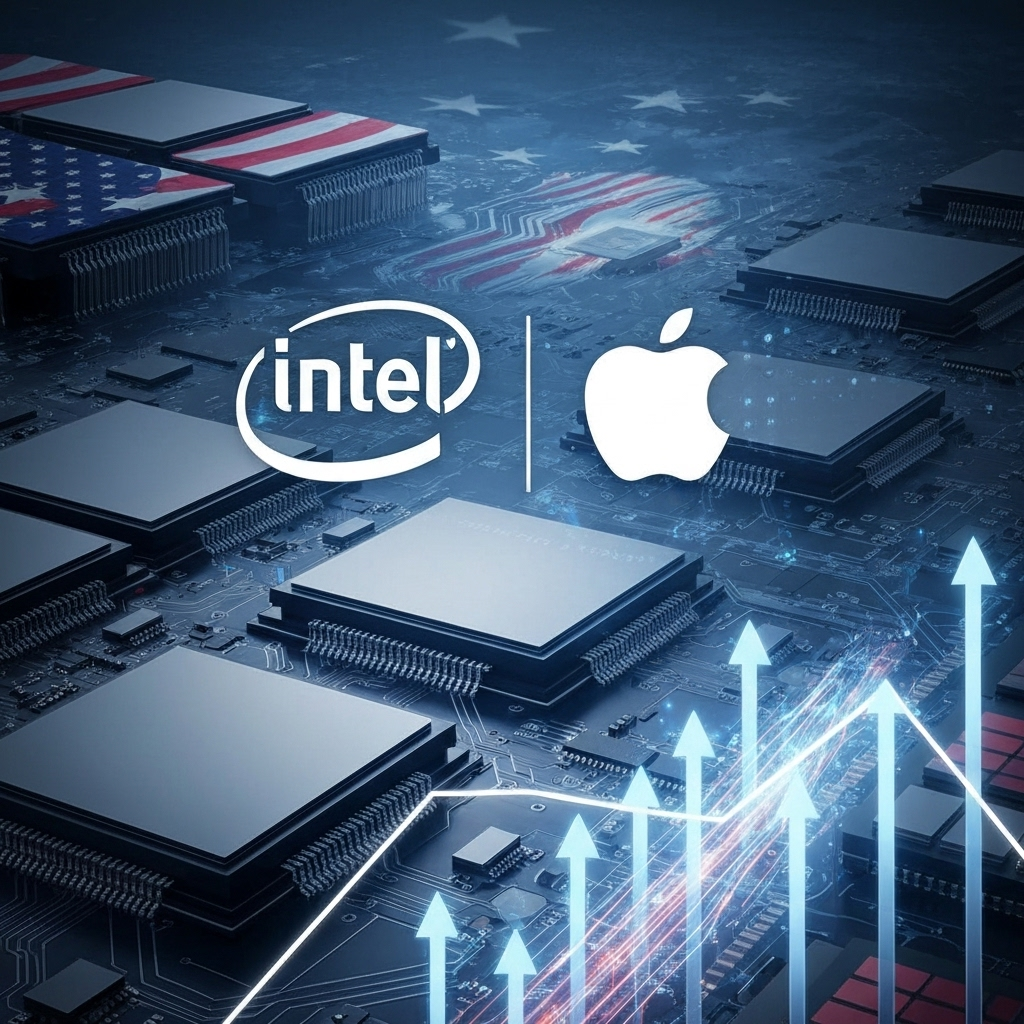
In a move that could significantly reshape the domestic semiconductor landscape, Intel Corporation (NASDAQ: INTC) has reportedly initiated discussions with Apple Inc. (NASDAQ: AAPL) regarding a potential investment. These early-stage talks are unfolding against the backdrop of a fervent push to revitalize US-based chip manufacturing, with Intel positioned as a cornerstone of the nation's strategic efforts to secure its technology supply chain. While a formal agreement remains uncertain, the mere prospect of such a partnership signals a pivotal moment for both tech giants and the broader industry.
The immediate implications of a successful deal are multifaceted. For Intel, an investment from Apple, a company that famously transitioned away from Intel processors five years ago, would serve as a powerful validation of its ambitious turnaround strategy and its burgeoning foundry business. For Apple, it represents an opportunity to diversify its critical chip supply chain, reducing reliance on overseas manufacturers like Taiwan Semiconductor Manufacturing Company (NYSE: TSM) and aligning with US government initiatives aimed at bolstering domestic production and resilience.
A Strategic Overture in the Race for Domestic Chip Dominance
Intel's pursuit of Apple's investment is a critical component of its aggressive strategy to regain its footing as a leading-edge chip manufacturer and a major foundry service provider. This initiative is heavily supported by the US government, which views Intel as essential to national security and economic competitiveness in the semiconductor sector. The strategic importance of Intel was underscored by the Trump administration's unconventional acquisition of approximately a 10% stake in the company in August, coupled with a five-year warrant for an additional 5% if Intel reduces its foundry division ownership below 51%, ensuring sustained US control.
The timeline leading to this potential partnership highlights Intel's determined pivot. After Apple's high-profile shift to its proprietary M-series silicon for Macs, Intel embarked on a multi-billion-dollar investment spree, particularly in its foundry business. This includes the construction of new advanced fabrication facilities (fabs) in Arizona and Ohio, heavily subsidized by the US CHIPS Act. These efforts aim to attract external clients, including former rivals, to manufacture their chips at Intel's US facilities. Further bolstering its position, Intel recently secured a $5 billion investment from Nvidia Corporation (NASDAQ: NVDA) for collaboration on PC and data center chips, and a $2 billion investment from SoftBank Group (TYO: 9984). These investments underscore a broader industry trend towards diversifying manufacturing and strengthening the domestic supply chain.
Key players in this unfolding drama include Intel, the US government (via the CHIPS Act and direct investment), and Apple, with Taiwan Semiconductor Manufacturing Company (TSM) as the incumbent primary manufacturer for Apple's custom silicon. Initial market reactions suggest that while Apple is unlikely to revert to Intel processors for its core devices, an investment could lead to collaboration in other areas, such as advanced packaging or the manufacturing of other components. Such a partnership would provide Apple with crucial supply chain flexibility and faster ramp-up capabilities for future products, while offering Intel the substantial volume and confidence needed to justify its massive foundry investments. Furthermore, an investment in Intel could strategically benefit Apple by demonstrating its commitment to domestic manufacturing initiatives, potentially appeasing US government scrutiny.
The Winners and Losers: Reshaping the Semiconductor Ecosystem
A potential investment by Apple in Intel's manufacturing capabilities would send significant ripples through the global semiconductor industry, creating clear winners and losers. The most immediate beneficiary would undoubtedly be Intel (NASDAQ: INTC). Such a deal would inject much-needed capital into its ambitious foundry expansion plans, validating its IDM 2.0 strategy to become a major contract chip manufacturer. More importantly, securing Apple as an "anchor client," even for a portion of its chip pipeline or for advanced packaging services, would provide crucial volume, technological credibility, and a substantial boost in confidence for Intel's ability to compete with industry leaders like TSMC. This could accelerate Intel's roadmap to regain process leadership and diversify its revenue streams beyond its traditional CPU business.
Apple (NASDAQ: AAPL) stands to gain significant strategic advantages. While it is highly unlikely to abandon its successful M-series custom silicon for Intel's processors, an investment would secure a crucial second source for chip production within the United States. This diversification mitigates geopolitical risks associated with its current heavy reliance on TSMC's Taiwan-based fabs, particularly amidst rising tensions in the Indo-Pacific. By investing in Intel, Apple could gain greater control over its supply chain, potentially leading to faster innovation cycles, more secure intellectual property, and reduced logistics complexities. This move would also align Apple with US government incentives for domestic manufacturing, potentially improving its standing with regulators.
Conversely, Taiwan Semiconductor Manufacturing Company (NYSE: TSM) could face competitive pressures. While Apple's shift away from TSMC is not expected to be immediate or complete, any diversification of Apple's orders to Intel would represent a loss of potential revenue and market share for TSMC. As the dominant player in advanced foundry services, TSMC thrives on high-volume, leading-edge orders from major clients like Apple. Even a partial shift or the development of a strong alternative domestic supplier in Intel could prompt other tech giants to consider similar diversification strategies, potentially slowing TSMC's growth trajectory in the long term, particularly for US-based customers. Competitors like Advanced Micro Devices (NASDAQ: AMD) and Nvidia (NASDAQ: NVDA), while not directly impacted by this specific investment, would observe Intel's resurgence with keen interest. A stronger, more competitive Intel foundry could eventually offer them alternative manufacturing options, but also intensify competition in the processor market.
Broader Implications: A New Era of Onshoring and Supply Chain Resilience
This potential Intel-Apple partnership transcends a mere business deal; it is a powerful symbol of a broader, epoch-defining shift in the global semiconductor industry towards onshoring and supply chain resilience. The event fits squarely into the overarching trend of nations prioritizing domestic chip production, driven by lessons learned from pandemic-induced supply chain disruptions and escalating geopolitical tensions. The US government, through initiatives like the CHIPS and Science Act, has committed billions to incentivize companies like Intel to build and expand advanced manufacturing facilities on American soil, aiming to reduce dependence on East Asian foundries.
The ripple effects of such a collaboration could be profound. For competitors and partners across the tech ecosystem, it signals a growing imperative to evaluate and potentially diversify their own supply chains. Companies that have historically relied solely on overseas manufacturing might accelerate plans to explore domestic or near-shore options, especially if Intel proves its capabilities with Apple's backing. This could foster a more geographically diverse and robust semiconductor ecosystem, potentially spurring innovation in domestic manufacturing technologies and processes.
Regulatory and policy implications are also significant. A successful Intel-Apple partnership would be hailed by policymakers as a major victory for the CHIPS Act, demonstrating its effectiveness in attracting private investment and fostering domestic manufacturing. This could embolden further government intervention and support for strategic industries, potentially setting precedents for other sectors deemed critical for national security. Historically, periods of intense geopolitical competition have often driven similar pushes for industrial self-sufficiency, such as during the Cold War. This current movement mirrors those efforts, but with a renewed focus on the digital infrastructure that underpins modern economies. The emphasis on securing the supply of advanced chips reflects a recognition that semiconductor leadership is synonymous with economic and military power in the 21st century.
What Comes Next: Navigating a Shifting Semiconductor Landscape
The path forward following this potential Intel-Apple collaboration presents a dynamic interplay of short-term adjustments and long-term strategic shifts for the semiconductor industry. In the short term, the market will closely monitor the progress of these discussions. If an agreement materializes, the immediate focus will be on the specifics: the size of Apple's investment, the nature of their manufacturing collaboration (e.g., specific chip components, advanced packaging, or even a future process node), and the projected timelines for production ramp-up at Intel's US fabs. This could lead to a significant boost in Intel's stock performance (NASDAQ: INTC) and renewed investor confidence in its foundry strategy.
Longer term, this partnership could catalyze a broader re-evaluation of supply chain strategies across the tech sector. Other major fabless design companies might explore similar arrangements with Intel or other emerging domestic foundries, further diversifying the global manufacturing footprint. This could lead to a more resilient, albeit potentially more complex and costly, supply chain. For Intel, the challenge will be to consistently execute on its manufacturing roadmap, achieving process parity or leadership with TSMC (NYSE: TSM) and delivering on its promises to Apple and other potential clients. This demands sustained capital investment, talent acquisition, and relentless innovation in a highly competitive environment.
Potential strategic pivots for both companies could involve Apple (NASDAQ: AAPL) gradually increasing its domestic production footprint, not just with Intel but potentially through other partnerships or even its own future manufacturing endeavors. For Intel, it solidifies its transformation into a hybrid IDM and foundry model, requiring a cultural shift towards serving external customers with the same rigor it applies to its internal product divisions. Market opportunities may emerge for ancillary industries supporting domestic chip manufacturing, such as equipment suppliers, materials providers, and skilled labor development programs. Conversely, challenges include managing the higher costs of US-based manufacturing compared to established Asian foundries and navigating the complexities of integrating diverse manufacturing processes and intellectual property. Potential scenarios range from a highly successful, deep partnership that fundamentally alters the semiconductor landscape to a more limited engagement that primarily serves as a symbolic gesture of supply chain diversification.
Wrap-Up: A Pivotal Moment for US Chip Independence
The reported discussions between Intel (NASDAQ: INTC) and Apple (NASDAQ: AAPL) represent a truly pivotal moment in the ongoing saga of global semiconductor manufacturing. The key takeaway is the accelerating drive towards national self-sufficiency in critical technologies, with the US government and leading tech companies actively working to reduce reliance on concentrated overseas production. This event underscores Intel's renewed strategic importance as a national asset and Apple's pragmatic approach to de-risking its supply chain amidst a volatile geopolitical climate.
Moving forward, the market will be closely assessing Intel's ability to execute on its ambitious foundry plans and deliver on advanced process technology nodes. A successful partnership with Apple would not only provide a significant financial and reputational boost but also serve as a proof point for the viability of advanced US-based chip manufacturing. For investors, the coming months will be crucial for monitoring Intel's progress in attracting other major clients to its foundry services, its capital expenditure trajectory, and any further announcements regarding the Apple collaboration. Similarly, investors in Apple should watch how this potential investment impacts its supply chain resilience and its strategic positioning in the face of evolving geopolitical dynamics.
Ultimately, this development signals a long-term shift towards a more distributed and resilient semiconductor supply chain. While the road ahead is fraught with challenges, the combined might of Intel's manufacturing ambition and Apple's strategic investment could forge a new path for US chip independence, with lasting impacts on global technology, economics, and national security for decades to come.
This content is intended for informational purposes only and is not financial advice






